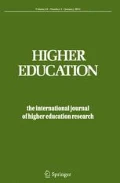Abstract
Student note-taking is an almost universal activity among university students, yet few naturalistic studies have examined relationships between note-taking practices and subsequent examination performance. Complete sets of notes on an introductory psychology course, involving 75 lectures presented by ten instructors, were obtained from nineteen male and nineteen female students. Notes on ten selected lectures (one per instructor) were analysed, and information derived about class attendance and the quantity, organization, and presentation of the notes. Variables based on this information were then correlated with performance on two three-hour final examination papers (one multiple-choice, one essay). High correlations were found between the quantity of notes and examination performance. Surprisingly, these correlations increased in subsamples consisting of those students who attended class most diligently. The correlations involving the multiple-choice examination tended to be higher than those involving the essay examination, most probably because of wider sampling of lecture content and a more factual orientation in the multiple-choice examination. The results appear to conflict with the advice given in student study guides, many of which suggest that students should be very selective and concise in their note-taking.
Similar content being viewed by others
References
Bronfenbrenner, U. (1976). “The experimental ecology of education,” Teachers College Record 78: 157–204.
Carrier, C. A. and Titus, A. (1979). “The effects of notetaking: a review of studies,” Contemporary Educational Psychology 4: 299–314.
Crawford, C. C. (1925). “The correlation between college lecture notes and quiz papers,” Journal of Educational Research 12: 282–291.
Ganske, L. (1981). “Note-taking: A significant and integral part of learning environment,” Educational Communications and Technology 29: 155–175.
Greene, E. B. (1928). “Lecture vs. reading,” Genetic Psychology Monographs 4: 457–460.
Hartley, J. and Davies, I. K. (1978). “Notetaking: A critical review,” Programmed Learning and Educational Technology 15: 207–224.
Hartley, J. and Trueman, M. (1978). “Note-taking in lectures: A longitudinal study,” Bulletin of the British Psychological Society 31: 37–39.
Howe, M. J. A. and Godfrey, J. (1977). Student Note-Taking as an Aid to Learning. Exeter, UK: Exeter University Teaching Services.
Ladas, H. (1980a). “Notetaking on lectures: An information-processing approach,” Educational Psychologist 15: 44–53.
Ladas, H. (1980b). “Summarizing research: A case study,” Review of Educational Research 50: 597–624.
Locke, E. A. (1977). “An empirical study of lecture note taking among college students,” Journal of Educational Research 71: 93–99.
Rickards, J. P. (1979). “Notetaking: theory and research,” Improving Human Performance Quarterly 8: 152–161.
State Services Commission, New Zealand (1971). Effective Study. Wellington, New Zealand: Government Printer.
Author information
Authors and Affiliations
Rights and permissions
About this article
Cite this article
Nye, P.A., Crooks, T.J., Powley, M. et al. Student note-taking related to university examination performance. High Educ 13, 85–97 (1984). https://doi.org/10.1007/BF00136532
Issue Date:
DOI: https://doi.org/10.1007/BF00136532



